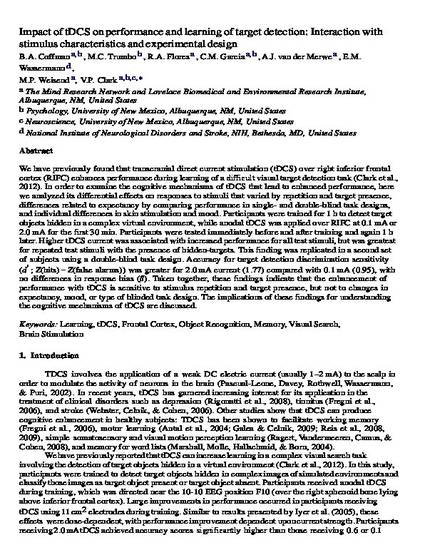
We have previously found that transcranial direct current stimulation (tDCS) over right inferior frontal cortex (RIFC) enhances performance during learning of a difficult visual target detection task (Clark et al., 2012). In order to examine the cognitive mechanisms of tDCS that lead to enhanced performance, here we analyzed its differential effects on responses to stimuli that varied by repetition and target presence, differences related to expectancy by comparing performance in single- and double-blind task designs, and individual differences in skin stimulation and mood. Participants were trained for 1 h to detect target objects hidden in a complex virtual environment, while anodal tDCS was applied over RIFC at 0.1 mA or 2.0 mA for the first 30 min. Participants were tested immediately before and after training and again 1 h later. Higher tDCS current was associated with increased performance for all test stimuli, but was greatest for repeated test stimuli with the presence of hidden-targets. This finding was replicated in a second set of subjects using a double-blind task design. Accuracy for target detection discrimination sensitivity (d’ ; Z(hits) − Z(false alarms)) was greater for 2.0 mA current (1.77) compared with 0.1 mA (0.95), with no differences in response bias (β). Taken together, these findings indicate that the enhancement of performance with tDCS is sensitive to stimulus repetition and target presence, but not to changes in expectancy, mood, or type of blinded task design. The implications of these findings for understanding the cognitive mechanisms of tDCS are discussed.
Available at: http://works.bepress.com/michael_weisend/4/

This is the author's version of the article. The final version is available at http://www.sciencedirect.com/science/article/pii/S0028393212001261.